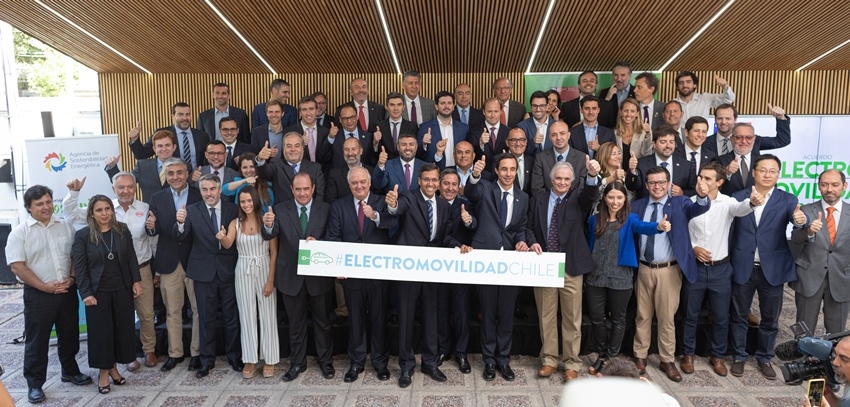News
SQM Signs Public-Private Commitment to Promote Electromobility

(Español) La empresa minera se unió a la tercera versión de este acuerdo que busca la creación de instrumentos de financiamiento específico para la inversión en electromovilidad, desarrollo de capital humano, ampliar la oferta de vehículos eléctricos, aumentar la cantidad de cargadores, entre otras acciones.
The mining company joined the third version of this agreement, which looks to create specific financing instruments for investments in electromobility, develop human capital, broaden the supply of electric vehicles and increase the number of chargers, among other actions.
SQM, a Chilean company that has established itself as one of the global leaders in the production of lithium, a key input for the development of electromobility, joined 53 other institutions in signing the third version of the public-private commitment to develop short-term actions and projects that help publicize the advantages of electromobility in Chile and promote a shift in domestic transportation.
The commitments made this year are grouped into six areas: increasing the supply of electric vehicles; incorporating the technology into corporate or subcontracted vehicle fleets; increasing the availability of charging stations for electric vehicles; driving research and human capital projects; developing financing alternatives; and contributing information to develop public policy and disseminate information regarding electromobility.
After signing the agreement, Pablo Pisani, Director of Communications, Sustainability and Public Affairs at SQM, commented: “It was natural for us to be part of this initiative in our role as global leaders in the production of lithium and its derivatives, which has allowed us to contribute to the automotive industry’s green revolution. We have accomplished all this through a sustainable production process that involves 95.8% solar power.”
The executive also added that the mining company is focusing all its efforts on reducing the carbon footprint of its operations, which is already very low because of the brines. For example, the CO2 emitted by SQM in producing lithium carbonate (1.5 kg CO2-eq/kg) is much less than emissions from the production of beef (19 kg CO2-eq/kg).
The signing of the agreement was led by the Minister of Energy, Juan Carlos Jobet; together with the Minister of Transportation and Telecommunications, Gloria Hutt; the Undersecretary of Energy, Francisco López; the Vice President of the Chilean Development Corporation (Corfo), Pablo Terrazas; and the executive director of the Energy Sustainability Agency, Ignacio Santelices.
The Energy Minister highlighted that, as a government, “we made the ethical decision to be carbon neutral by 2050 and, in order to achieve that, the plan is to clean our generation matrix and use clean energies in other sectors. We need this plan to be shared by all players, which makes the commitment we are signing today all the more relevant. More than one fourth of greenhouse gas emissions are generated from burning oil and oil derivatives in transportation. Therefore, as we clean our energy matrix, we are going to be able to use that clean energy in private cargo vehicles and public transportation.”
Minister Hutt explained, “We are betting on electromobility in public transportation, not only because of the evident benefits in service quality, with less noise and other features incorporated into buses, such as air conditioning and Wi-Fi, but also because it represents a real commitment to a cleaner environment. Sustainable transportation will enable us to shape cities with better quality of life for all.”
Ignacio Santelices indicated that “sustainable transportation improves quality of life in our cities: walking, biking, having better public transportation and electromobility. To move forward on the latter, the public-private relationship is key, which the Energy Sustainability Agency promotes together with the ministers of Energy and Transportation, as well as players like Corfo, and the more than 50 private institutions that have signed the third public-private agreement for electromobility.”
The 2020 agreement looks to quintuple the number of chargers for electric vehicles; expand the supply of electric vehicles by more than 300 light vehicles, trucks, buses and vans; organize the second International Electromobility Fair; train human capital, including a new electromobility degree certificate, training for technicians and a project to build skills for maintaining electric vehicles and installing electric chargers.
